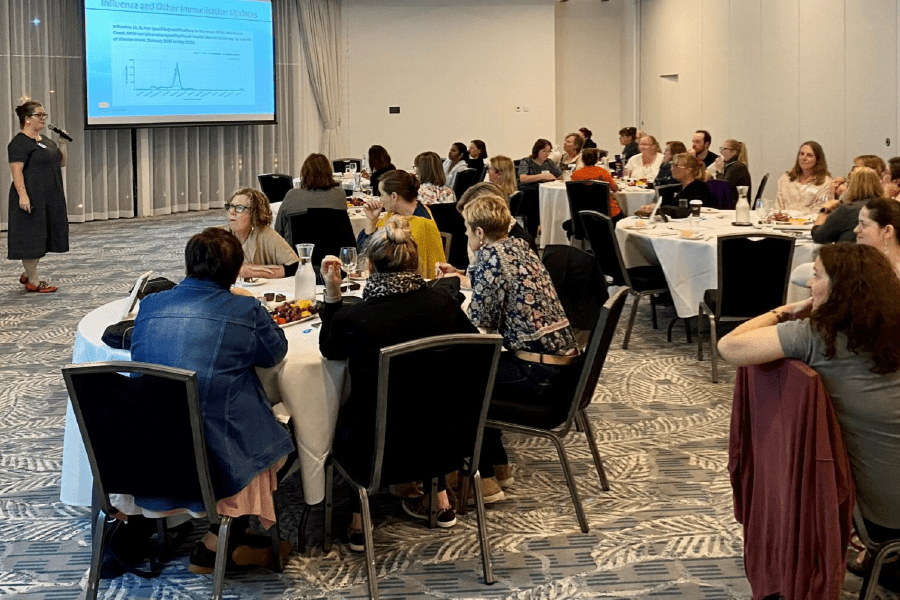Healthy North Coast recently partnered with North Coast Public Health to deliver 6 education dinners, with many highlights and key takeaways.
Maintaining high immunisation coverage rates is something that all primary health care providers need to achieve. Most vaccinations are provided in primary care settings and it’s important that immunisation providers remain up to date on the best available vaccines for preventable diseases, immunisation schedules and immunisation practise.
Over the past month, Healthy North Coast worked in partnership with Carolyn Lloyd, Immunisation Coordinator and Clinical Nurse Consultant for North Coast Public Health, to deliver an immunisation update roadshow.
With flu season kicking off for 2022 and a new shingles vaccine available in Australia, it was the perfect time to deliver immunisation education across the Healthy North Coast footprint. The roadshow featured 6 events held in 6 locations: Port Macquarie, Kempsey, Grafton, Coffs Harbour, Kingscliff and Alstonville.
‘It was great to put so many faces to names after only meeting people through a screen over the last couple of years,’ Ms Lloyd said.
‘Immunisation is all about quality trusting relationships. It was lovely to renew our professional relationships and to talk about priorities in immunisation for our clients and communities.’
Attending the face-to-face events were 242 GPs, nurses, pharmacists and other health professionals. The events included a two-course meal, presentations and a fun-filled interactive game (complete with prizes).
Of attendees, 92% said their learning needs were met and more than 80% indicated the update was likely to change their practice. Feedback suggests the education was delivered in an enjoyable, entertaining and informative way.
Testimonials
‘Carolyn was excellent’ – Port Macquarie practice nurse
‘The information was good, well-presented and humorous’ – Kempsey clinical nurse
‘It was very interesting and Carolyn was engaging and easy to listen to’ – Grafton practice nurse
‘Carolyn is a great presenter. Held my attention the whole time. Best update I’ve attended’ – Coffs Harbour practice nurse
Feedback also suggested the food was great, as was the networking.
‘Exchanging work practice ideas with the network of nurses over a nice dinner was fantastic’ – Tweed Heads practice nurse
‘A very enjoyable evening. Guideline game was fun, slides were easy to read, the food was lovely, the face-to-face networking much needed’ – Northern Rivers clinical nurse
For Eva James, Population Health Lead at Healthy North Coast, the opportunity to partner with Ms Lloyd to deliver this important education couldn’t have come at a better time.
‘We have so many skilled, thoughtful and passionate immunisers in our region, and it was just so nice to see everyone collaborating, laughing and learning together in person,’ Ms James said.
‘We have a long-standing relationship with the North Coast Public Health Unit through the Immunisation North Coast Committee, and it is always a pleasure working together.
‘Increasing immunisation coverage is a key priority for all of us and by working together we are better equipped to support immunisation providers and improve health outcomes in our communities.’
If you missed the chance to attend this education event, Ms Lloyd and Ms James have provided some top takeaways for those who couldn’t make it.
- Influenza and COVID-19 are serious respiratory viruses that need to be a priority for immunisation over the next couple of months.
- The priority for the year is to ensure that our most vulnerable clients and communities are immunised against both viruses as recommended.
- Children’s immunisations, including Influenza vaccinations, are particularly important. After two years of having our borders closed and being under pandemic precautions, we are expecting an increase in communicable disease. It’s crucial to keep children up to date with scheduled immunisations.
- Shingles is a serious vaccine-preventable disease. Vaccination has reduced the incidence and severity of the disease and should be offered to all 70–79-year-olds under the National Immunisation Program.
- Offer vaccines routinely and consider shingles and pneumococcal vaccines at the same appointment where appropriate.
- Throw out your printed Australian Immunisation Handbook – it’s out of date. Use the digital Australian Immunisation Handbook and/or download the app.
- Ensure you have access to the Australian Immunisation Register (AIR). Report all vaccines and review your patients’ AIR statements.
A special thanks to Dr Brett Lynam for co-facilitating the Tweed Valley event.
Are you worried you’ll miss future Healthy North Coast education events? Stay up to date with all Healthy North Coast events by bookmarking this page: hnc.org.au/events
You can also sign up to your local clinical society for news of relevant events in your local region: hnc.org.au/clinical-societies



